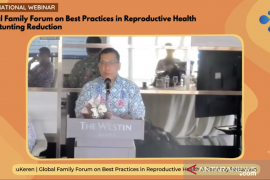Stunting is a disorder of child growth and development due to chronic malnutrition, continual infections and lack of supportive environmental stimulationJakarta (ANTARA) - Having breakfast and limiting caffeine consumption can help prevent pregnant women from having stunted babies, Head of the National Population and Family Planning Agency (BKKBN) Hasto Wardoyo emphasized.
"Stunting is a disorder of child growth and development due to chronic malnutrition, continual infections and lack of supportive environmental stimulation," Wardoyo said here on Sunday.
He said the occurrence of stunting is characterized by the child's height being below the proper standard, and this disorder will have a long-term impact until the old age.
Therefore, he advised mothers, especially those who are pregnant, to have breakfast. Although it is not uncommon to experience morning sickness, having breakfast with a menu rich in calcium, such as wheat bread, biscuits or bananas are very good for the body, he explained.
Related news: Program, target accuracy key to accelerating stunting reduction: BKKBN
He also suggested to increase the portion of green vegetables and fruit. Moreover, white rice can sometimes be replaced by brown rice which is rich in antioxidants, proteins, vitamin E, he pointed out.
All of these foods should be balanced with healthy, low-fat snacks, such as yogurt or nuts, in addition to iron supplements for smooth blood circulation, blood-increasing drugs to reduce the risk of anemia, and folic acid for the fetus' growth and development, Wardoyo said.
Related news: KIA Bill obligates gov't fulfilling maternal, child nutritional needs
"The nutritional intake of pregnant women is an important factor, both for the nutritional fulfillment for her and the fetus' development in the womb," he said.
The most important nutrition is animal proteins such as fish. It is advised that pregnant women have at least perfectly-cooked fish twice a week in their menu,, according to the BKKBN chief.
Although there are pros and cons related to caffeine during pregnancy, experts recommend limiting caffeine consumption for pregnant women to 200 mg per day or the equivalent of two cups of instant coffee, he added.
Related news: Low budget absorption hindering stunting reduction efforts: BKKBN
Related news: BKKBN tackling sanitation, family toilet issues using PK21 data
Translator: Hreeloita S, Kenzu T
Editor: Fardah Assegaf
Copyright © ANTARA 2022












